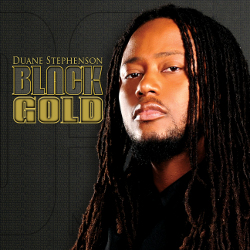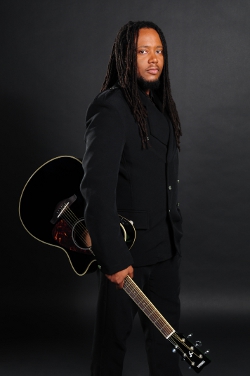Articles about reggae music, reviews, interviews, reports and more...
Interview: Duane Stephenson, Jamaican Voice, Global Consciousness
- Home
- Articles
- Interviews
- Interview: Duane Stephenson, Jamaican Voice, Global Consciousness

Interview: Duane Stephenson, Jamaican Voice, Global Consciousness
"I always like to leave an underlying message of hope in my songs, because while we are all going through these things, the message of hope can still resonate"
Sampler
Jamaican singer Duane Stephenson is not on a hype thing. He doesn’t have a gimmicky look, a controversial song in the charts, a flashy image or Rasta entourage to back him up. Instead, the conscious 34 year-old puts all of his passion, thought and ideas into his songs. His debut album on VP Records 'From August Town' established Stephenson as a fierce champion for the poor and oppressed with songs about complex economic, political and personal relationships. His vocal delivery has the nasal resonance of Jimmy Cliff and the introspective quality of artists like Ijahman Levi but it can also soar with heartfelt intensity.

The latter trait is heard on Sufferers Heights, the magnificent lead single from Stephenson’s new album 'Black Gold', produced at Tuff Gong with Cannon Productions boss and saxophone legend Dean Fraser. The album also features legendary dub poet and radio host Mutabaruka, rising lioness Queen Ifrica and Morgan Heritage’s Gramps Morgan who also appears alongside Stephenson in the video for the song Rescue Me. We caught up with Stephenson in Jamaica to talk about green energy, global issues and what this inspiring singer is doing next.
What have you been doing to promote your latest project Black Gold?
I’m trying to jump on all the avenues that I can, whether its radio interviews, studio or live appearances. One of the major plans is to travel into new areas. California is place that I’m really passionate about getting to this time around.  I’m really looking forward to going out there. We’re making sure were prepared with the proper band and show for when we get there.
I’m really looking forward to going out there. We’re making sure were prepared with the proper band and show for when we get there.
How was your tour in September supporting The Wailers through the southern United States?
It was a great experience. Most of the places I’ve been to in America with Dean Fraser and the Black Soil band, Tarrus Riley and the whole Cannon crew have been in the traditional reggae markets like Fort Lauderdale (Florida). So for the most part the tour was a whole new ballgame. I learned a lot while I was there and got a great response from people who had never heard my music before.
What show was a highlight?
Actually, the first show at University of South Carolina was great; people were calling out for songs like Return, which I did a video for but was not on any album, and Fool For You on the August Town album. It’s not usual to go to places and hear those requests. People usually ask for August Town and Cottage In Negril.
During that time there were a lot of stories in the news about Buju, and Jamaican travel visas being revoked for dancehall artists. Did you experience any tribulations as a result of that?
A lot of the people who are putting this pressure on the artists pretty much know what they are looking for, and me or my music is not “it.” I generally try and keep a clean slate in music and in life, so I don’t have these problems.
What growth did you experience in the three years between recording From August Town and Black Gold?
I traveled extensively through the Caribbean and new places in America and Europe [to promote] 'August Town'. I experienced many different cultures throughout the world and I try and display that growth on the new album. Without growth you don’t really go forward. Often people do their first album and it works, but then they try and duplicate it. I’ve learned so much on this journey that I want to carry forward. Its not back to 'August Town' – we’ve done that and been there and now its time to move on.
 Without growth you don’t really go forward
Without growth you don’t really go forward
Are the songs on Black Gold focused more on international perspectives?
Well, a lot of what we’re seeing here in Jamaica, globally people are facing the same challenges. We don’t want to make it seem like we are in our little corner of the world and we’re oblivious to what’s outside because that’s not the case. So musically I tried to do that.
What was it like working with Dean Fraser on this latest album?
Well, you know, we’ve been working together even before my solo career. I was working with Dean as a member of the group To Isis. I did my first recording with Dean, so I always keep that close link. A lot of time we’re both at the studio and chatting about music and I’ve learned so much. Plus the people that he works with are great musicians – from Sly and Robbie, to the guys in Shaggy’s band, –Dean was the first to bring [producer] Christopher Birch into the business. And from Dean’s work from way back [as a member of] the 809 Band he ends up with good musical company.
I met Tarrus Riley though him. [Tarrus and I] started out at the same time with our solo careers. Tarrus and I had a link from way back too, so it’s a bredrin vibe. [Queen] Ifrica (who appears on 'Black Gold') has been in the business a long time, so we’ve been friends from long before too. Gramps [Morgan] is more of a recent friend, but we’ve always known of each other’s work. The people that I chose to work with on the album are the people I thought would serve the songs best. For instance I have a track there with Mutabaruka (Truth Is), and it’s a powerful track. When he came in and did his thing, it was well hitting. And the same thing with Ifrica, I think she really embodies what the song (Stay Ay Home) is about. And of course Ras Shiloh (on the track “Soon As We Rise”) is a powerful voice in reggae now; I think he’s much under-rated as a singer.
You and Gramps trade verses humorously on the song Rescue Me – it’s like a musical argument for a woman’s affections.
Trust me – that song went down in like hour! It was just a fun thing. I wrote the song and called Gramps and said, ‘Bwoy Gramps, I have this track I want you to be on.’ He got back and told me when he was going to be in Jamaica. When we went to record he told me he had listened to it only one time and started laughing and never listened to it again! So he got to the studio and everything was just so much fun – doing the lickle arguments and ting (in the song). The chemistry was just fabulous. It’s kind of like that Michael Jackson and Paul McCartney song The Girl Is Mine. Sometimes you just have to have fun with music.
You record most of your music at Tuff Gong studios?
I record most of my stuff at Tuff Gong because you can’t substitute for the sound you get out of there. It’s the ultimate place to get a basic track, like the drum and bass. Most of the overdubs and vocals are done at Grafton Studios, in Vineyard Town.
 I record most of my stuff at Tuff Gong because you can’t substitute for the sound you get out of there
I record most of my stuff at Tuff Gong because you can’t substitute for the sound you get out of there
You’re not an over-recorded artist in the Jamaican market who appears on every new riddim. Does that make writing your albums more special?
I take pride in [the fact that I’m not over-recorded} because a lot of times people try and use that as a avenue to get power in the business, by sheer volume of releases. But volume is not special. It’s like when you get some thing at the store and its 10 for a dollar. But when you pay just a little bit more it can be more special. I don’t believe in volume, I believe in recording a good song for what it is worth.
The title song Black Gold talks about situations in Iraq, Sudan and Somolia. Are you talking specifically about the politics of oil and fuel or is it just metaphoric?
 I don’t believe in volume, I believe in recording a good song for what it is worth
I don’t believe in volume, I believe in recording a good song for what it is worth
 Well most of it is literally about oil production, because we’ve gone through a period of spending so much on getting oil when we know that green energy is what we need now. People doing research [on renewable energy] have to beg for money for it. It’s like how we’re spending so many billions worldwide to go to Mars when we don’t live there now and we don’t know if we can ever live there. It’s also about an everyday thing, you know, how so much people dying of hunger. I’ve been doing some work with the World Food Program of late and I found out that 15, 000 children die every day of hunger. A lot of people are oblivious of this.
Well most of it is literally about oil production, because we’ve gone through a period of spending so much on getting oil when we know that green energy is what we need now. People doing research [on renewable energy] have to beg for money for it. It’s like how we’re spending so many billions worldwide to go to Mars when we don’t live there now and we don’t know if we can ever live there. It’s also about an everyday thing, you know, how so much people dying of hunger. I’ve been doing some work with the World Food Program of late and I found out that 15, 000 children die every day of hunger. A lot of people are oblivious of this.
Sufferers Heights is another very powerful song where you contrast two different points of view, one of annoyed wealthy person whose day isn’t going well, and the struggle of the poor. Tell us about that song.
The truth is, I think the song that speaks to these times the most is “Sufferers Heights.” Because we understand the situation in the world for the average man, you know weh mi a say – tings are rough. You don’t need to be living in any particular part of the world to be going through that stress or strain. It’s a worldwide thing. So looking at the perspective of the average man, they might say, ‘Bwoy, life hard ‘cause me cyaan pay the light bill’ but you can’t let that get you down because there’s always someone having it a little bit worse then you are. [The song] is saying that even though me seh bwoy, tings hard, consider giving a lickle of what you have left. I always like to leave an underlying message of hope in my songs, because while we are all going through these things, the message of hope can still resonate.
 We know that green energy is what we need now
We know that green energy is what we need now
Who are some of your music influences from Jamaica?
At the forefront would definitely be Peter Tosh. I like what his music represents and the fact that he lived the values of his music. He was never a man to water down his opinions, he was that forward. And as a vocalist and a writer I totally respect Jimmy Cliff. I always thought that Jimmy Cliff was the premier vocalist out of Jamaica. Other than that I listen to a wide cross-section of music – from early dancehall like Buju, Ninjaman and Supercat, rocksteady from John Holt, Heptones and all those groups.
What are your thoughts on the passing of Gregory Isaacs?
Well, Gregory Isaacs is a big loss to the reggae community. We can learn a lot of lessons from the life of Gregory Isaacs, both good and bad. Because he’s an example a man coming from down there in Trenchtown who from working hard and doing this kind of music became world famous.  Then you can look at his whole road of self-destruction that went on until his later days and then all the changes he tried to make, but by then it was too late. Nevertheless, Gregory Isaacs did so much for the music and the culture that we can’t deny that he was a great influence on many of us. Luckily I had the opportunity to work with Gregory Isaacs on many occasions. I can’t boast the same for some of the other legends that have passed on, but at least I got to spend some real time with him and he will be greatly missed.
Then you can look at his whole road of self-destruction that went on until his later days and then all the changes he tried to make, but by then it was too late. Nevertheless, Gregory Isaacs did so much for the music and the culture that we can’t deny that he was a great influence on many of us. Luckily I had the opportunity to work with Gregory Isaacs on many occasions. I can’t boast the same for some of the other legends that have passed on, but at least I got to spend some real time with him and he will be greatly missed.
What’s happening next for your music?
There are a lot of opportunities. Right now I’m focused on promoting 'Black Gold', because its early days yet, we’re just getting it out there. We’re looking for new avenues for getting the music out there. The one thing that’s going to remain consistent is to produce good wholesome music that the family can listen to. And I just want to tell your audience thank you for the support that I’ve been getting, thanks for the love and support from all over. I’m looking forward to coming out and playing for the people. Nuff blessings until that time.
Comments actually desactivated due to too much spams
Browse by categories
Recommended Articles
Latest articles
Recently addedView all
© 2007-2026 United Reggae. All Rights Reserved. Reproduction in whole or in part is prohibited. Read about copyright
Terms of use | About us | Contact us | Authors | Newsletter | A-Z














